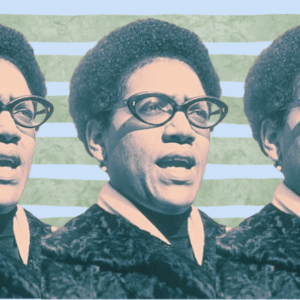
Lisa Suhair Majaj on Packing Big Emotions into 100 Words or Less
In Conversation with Kirsten Reneau for the Micro Podcast
Micro is a podcast for short but powerful writing. Each week features a few short pieces of fiction, creative nonfiction, and/or poetry read by the author. In the accompanying interview series, 5 Qs with Kirsten, Kirsten Reneau chats with a featured reader.
*
F. Scott Fitzgerald once wrote, “There are all kinds of love in this world but never the same love twice.” I would argue that the same is true of grief. These two feelings have become the bedrock for thousands of pieces of literature throughout time, and yet, we still write on them. I doubt we—the collective us, as writers and people—will ever stop. Perhaps it is because love and grief, despite how deeply intimate and individual they are, can tether us to others.
The combination of these two fiercely different and yet painfully intertwined emotions is one explored briefly and sharply in Lisa Suhair Majaj’s piece, “A Continuous Thread.” In this piece, Majaj perfectly straddles this line of the universalism and intimacy of love and grief, as well as the physical objects that remind us of how much we’ve gained and lost.
Listen to Lisa Suhair Majaj read “A Continuous Thread” on Micro.
Subscribe and listen in full, wherever you get your podcasts!
Kirsten Reneau: The pillow is such a smart, perfect object to tie the reader to the story as you navigate distance and time. Can you talk some about your decision to use it as a physical anchor to this largely emotional piece?
Lisa Suhair Majaj: Since my husband’s death I’ve been trying to repair and mend things around me, which is not always an easy process after loss. When I turned to the ripped pillow, I was flooded with deeply layered memories and emotions. The pillow is precious to me because it links me to my parents, to my Palestinian heritage, and to the life I made with my husband. It’s painful for the same reasons. The intricate tatreez (embroidery), created with labor and love by a Palestinian woman who might have been a refugee, made me think of the way lives are created stitch by stitch across distance and loss. Meanwhile the pillow’s familial and cultural resonances turned my mind to how we preserve connection and meaning.
KR: This essay is a total of one paragraph but tackles the hugely universal theme of grief. Can you talk a little bit about making these large emotions fit into less than 100 words?
LSM: I’m a poet, so I’m used to compressing language, but the 100-word limit was extremely hard. I had to trust that the brief words and images would allow emotional depth to resonate as well as tell the story. Initially my piece referenced the loss of my parents, who were more directly tied to the pillow, but not my husband—I did not quite know how to bring everything in in so limited a space, and also I wondered if it would make the piece too raw.
But the emotions sparked by the pillow were very much rooted in my current grief as well as in those older losses. Reworking the piece to mention the loss of my husband made me realize the true power of words. I needed only to utter the single word “widow” to evoke a dense, unspoken backstory.
KR: What, to you, makes the perfect plane ride?
LSM: Wow, plane rides… such a distant memory right now! To me, the perfect plane ride involves departing after a good night of sleep (rare!), take-offs and landings with beautiful geographies and cloudscapes, a window seat, a really good book, a notebook to write in, onboard movies (since I rarely watch movies in my daily life), decent food, and either a companion I love or space for solitude. Also, no extra excitement. (I was once on a plane that was hit by lightning and had to make an emergency landing.) But most of all, for a plane ride to be perfect for me, I need to be traveling for happy purposes.
KR: How did you decide on the ending of this essay?
LSM: My first version ended with “the widening rifts of loss, the intricate stitches constructing a life.” The editor proposed instead an ending emphasizing repair and creating new patterns. To me this was uncomfortable—it felt too reminiscent of the way bereaved people are pressured to “move on” instead of being allowed space for their grief. In any case, on a literal level, mending the pillow would preserve the existing pattern (also important because of issues around Palestinian identity), not create a new one. Happily, with good communication, we found a meeting point in a focus on continuity, an ending that allowed me to honor life, loss, and ongoing love.
KR: Can you talk a little bit about your writing process in general, where you find inspiration, and walk us through the submission process for this piece?
LSM: My writing process is generally a bit haphazard. I carry notebooks around to capture ideas, observations, phrases, images, chunks of freewriting. I shift to the computer to do more substantive writing and work on craft issues. I always generate multiple drafts of pieces (keeping all drafts in a separate folder), and often experiment with form in different versions to see what fits the text best. For this piece I wrote directly on the computer—and was grateful for the technology that allowed me to repeatedly check my word count!
I find inspiration in anything that sparks attention and emotion and associations—an object, a news article, a natural scene, a sound, an odor. Going for walks sharpens my awareness as well as freeing my mind to wander. I think losing my parents so early, and keeping so many mementos from them around me in my daily life, helped shape my understanding of how meaning is embedded in the simplest of things. I use potholders my mother crocheted, keep my dad’s paperweight on my desk, and think of them daily.
I’d been interested in submitting to Tiny Love Stories for a while—I’d already sent in one piece, about my last moments with my husband, but it wasn’t accepted. When the pillow sparked those interwoven emotions in me, I decided to shape them into a piece and try again. I was thrilled when I got the acceptance email saying they’d like to publish an edited version. We went through a fair amount of back and forth before we agreed on the edits and arrived at the piece that was published, but the editor was kind and receptive to my concerns. She ended up telling me my changes had improved the piece. I appreciate her graciousness.
_____________________________
Micro is edited and curated by Dylan Evers and produced and hosted by Drew Hawkins. Theme song is by Matt Ordes. Follow the show on Twitter at @podcastmicro.
Lisa Suhair Majaj won the Del Sol Press Poetry Prize for her volume Geographies of Light. In addition to poetry, she also writes creative nonfiction, critical essays, and children’s books. Her work has been widely published and has been translated into Arabic, Hebrew, Greek, German, Spanish, French, Indonesian, and Mayalam. Her poetry was included in the 2016 exhibition Aftermath: The Fallout of War—America and the Middle East (Harn Museum of Art). She lives in Nicosia, Cyprus.
Micro Podcast
Micro is a podcast for short but powerful writing. Each episode features a few short pieces of fiction, creative nonfiction, and/or poetry read by the author. Edited and curated by Dylan Evers and produced and hosted by Drew Hawkins.



















